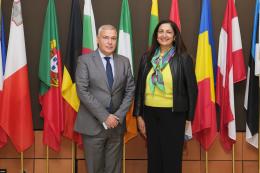European Economic
and Social Committee
Relazioni transatlantiche
L'Unione europea, gli Stati Uniti e il Canada condividono i valori della democrazia, dei diritti umani, della libertà economica e politica, e le loro politiche estere e le loro preoccupazioni in materia di sicurezza sono convergenti. Gli Stati Uniti e il Canada sono tra i principali partner commerciali dell'UE e sono anche partner nella definizione dell'ordinamento giuridico internazionale. Le relazioni transatlantiche oggi si svolgono in un nuovo contesto e si trovano ad affrontare sfide crescenti. Secondo il Comitato, il coinvolgimento della società civile in tale rapporto garantisce che le relazioni transatlantiche siano in grado di rispondere alle aspettative dei cittadini e contribuiscano efficacemente a plasmare una cooperazione reciprocamente vantaggiosa.
Il 30 ottobre 2016 sono stati firmati l'accordo economico e commerciale globale UE-Canada (CETA) e l'accordo di partenariato strategico. Il Comitato si adopererà per coinvolgere costantemente la società civile nell'attuazione di tali accordi. I negoziati tra l'UE e gli Stati Uniti in merito a un partenariato transatlantico su commercio e investimenti (TTIP) sono attualmente in stallo. Tuttavia, tali negoziati hanno contribuito a rafforzare i legami tra la società civile delle due regioni e a definire le posizioni di quest'ultima in merito alla forma che dovrebbero assumere le future relazioni commerciali tra le due parti. È auspicabile che tali risultati non vadano perduti. Il comitato di monitoraggio Relazioni transatlantiche è stato istituito nel settembre 2014 con il mandato di monitorare le relazioni transatlantiche con la società civile, instaurando un dialogo e consultazioni periodiche su questioni riguardanti i rapporti con gli Stati Uniti e il Canada.



